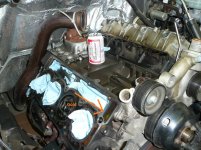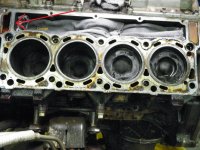And btw, to FTG-05, and anyone else regarding anti-freeze. In your pic it looks like possibly dexcool? Or maybe just the camera or something changing its appearance? You never want to stray from the Ford Gold antifreeze. Allot of people skimp and put green or orange to save a few bucks. I'm sure there are some other formulations that may be the same, I'm no chemist. Like maybe the Dodge equivalent (Hoat G05), but I'm not sure, I just always use Ford Gold. If you would like, I can explain why. Or I can mind my own business, lol. Just an observation, but it CAN cause major damage over time
I don't know how you could come to any conclusions about what antifreeze I use from my three pics, but whatever.
I replaced the Ford coolant at 40K miles when I found out that I had the wrong coolant in it: it had the Ford Green coolant from the factory/dealer (I ordered it and got it with less than 4 miles on the odometer). I replaced it all with CAT EC-1 spec'd coolant (Shell Rotella IRC).
Do what you want with your vehicle but I would never use Ford Gold coolant in a 6.0 diesel, period. The Ford Gold is a pretty good universal coolant but not for applacations where it is subjected to high temps, like in an EGR cooler. It contains silicates, these silicates come out of precipitation at high temps and will plug up the 6.0 oil cooler coolant passages.
Case in point: a friend of mine that had a 2004 with around 90k miles. EGR coolant leak diagnosed by the local Ford dealer. Even though my friend had the extended warranty, it would not cover it due to it being caused (they said) by "contaminated coolant) even though both the local dealer and his original dealer in VA both went to bat for him (warranty was through a third party, not Ford).
Since it wasn't covered by warranty and he had to pay for it himself, he got to keep the old parts, including the oil cooler, which he gave to me to cut up for research purposes.
Here are two pics of the oil cooler, you can clearly see that the coolant passages (the smaller ones) are almost completely clogged. He has since installed a coolant filter and has switched over to ELC (actually Ultra ELC) coolant.
So, I'm going to say it again just to make it absolutely clear: If you have a Ford 6.0 diesel: Replace the Ford Gold coolant with CAT EC-1 spec'd ELC or Ultra ELC coolant asap; along with installing a coolant filter. When, not if, you're EGR cooler starts leaking, install an EGR delete kit.
There is no way I'd use Ford Gold coolant in a diesel with an EGR cooler.




